Thursday Feb 19, 2026
Thursday Feb 19, 2026
Saturday, 15 December 2018 00:00 - - {{hitsCtrl.values.hits}}
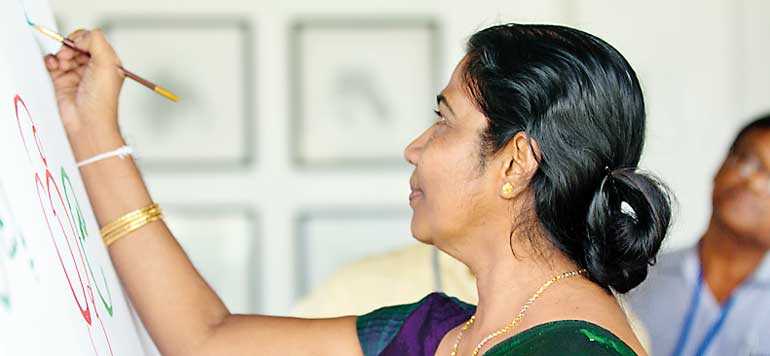
The Inauguration Canvas
By Aysha Maryam Cassim
Sri Lanka had the pleasure of hosting the 8th SAARC Artists Camp and Exhibition of Paintings from 4-6 December. Organised by the SAARC Cultural Centre, participation was very encouraging this year, with official nominations for the program from the SAARC Member States of Bangladesh, India, Maldives, Afghanistan and Sri Lanka.
The SAARC Artists Camp has been held for many years – bringing together artists from South Asia in an attempt to foster a friendly atmosphere that will broaden their creative frontiers. One of the camp’s defining features is the creative synergy between the artists – which is facilitated through the wonder of art.
Whatever their schools of thought or background may be, artists work together on a singular theme to capture the richness and complexity of their nation’s history, heritage and humans.
The 8th SAARC Artists Camp in Sri Lanka celebrated the splendour and vibrant tranquillity of South Asia. This was followed by preparations for the Exhibition of Paintings, displaying two paintings from each artist, created over the course of the Artists Camp.
This year’s program ceremoniously commenced with the inauguration – chaired by Ministry of Foreign Affairs South Asia and SAARC Division Deputy Director Thiloma Abayajeewa, Pakistan High Commission in Sri Lanka Press Attaché Intisar Ahmad Sulehry, Nepalese Embassy in Colombo First Secretary Dhana Kumari Joshi and University of the Visual and Performing Arts Faculty of Visual Arts Textile and Wearable Arts Head of Department and Senior Lecturer Dr. Priyantha Udagedara.
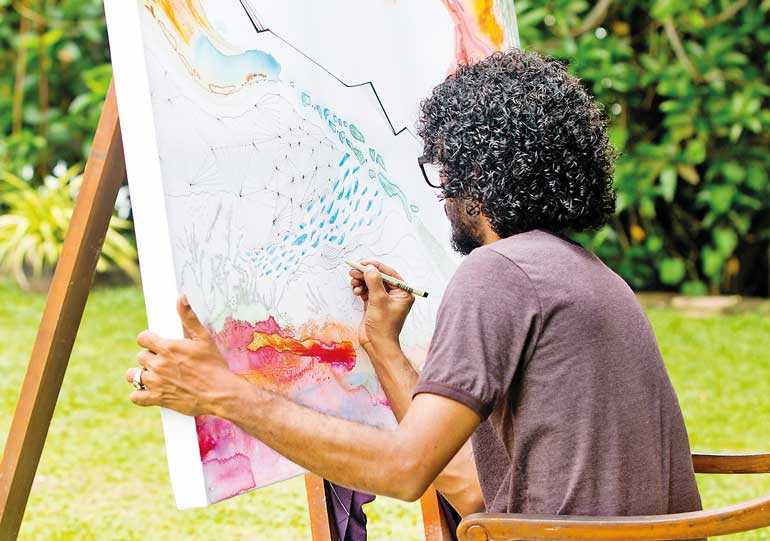
The event was officially declared open following the welcome address by the Director of the SAARC Cultural Centre D.K.R. Ekanayake, who in her speech stated that the camp would serve as a platform for the artists to build interregional relationships and enhance artistic collaboration, fulfilling the vision of SAARC Cultural Centre.
“I hope for peace and unity in the SAARC region. Art is something that perfectly encompasses diverse cultures and enable us to see similarities through differences,” she said.
Following the official Inauguration Ceremony, each delegation was introduced and presented with their art supplies. The first day at the camp was for the artists to come together, get to know each other and take in the tranquillity of the surroundings. The participating artists were given the opportunity to create works of artistry and expression, inspired by the scenic surroundings of Negombo Lagoon. Many artists erected their easels overlooking the beautiful waterfront. While some preferred to paint in the vicinity of where they found calm and quiet, the rest relished painting in the outdoors, experiencing the breeze and the beauty of the beautiful mangroves, birds, boats and many trawlers moored on the faraway shores.
Cultural connectivity lies at the core of a SAARC Artists Camp. During the three days at the Camp, we found art that resonated with the artist’s cultural identity and witnessed fond exchanges that kept the ambiance interactive and engaged. The meaning of an artwork is wrested from the artist’s hands. Certain paintings cannot be understood by only looking at the surface. They invite us to reimagine it in our own way.
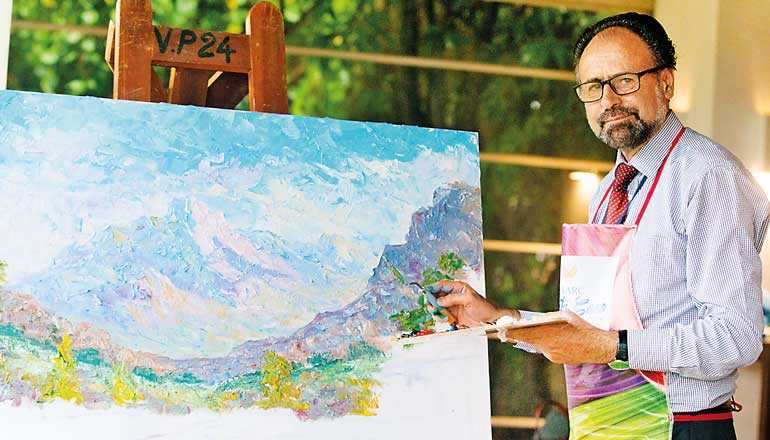
In a relaxed demeanour, Assefi painted his impressions of Bamiyan landscapes onto the canvas. It was a delight to watch him bring his native landscapes alive with a palette of vivid spring and summer hues. A medical doctor by profession, Dr. Yousef Assefi learned the fundamentals of painting from his teacher Nasrullah Sarwari. He takes a soulful approach to paint the conceptions of his impressions. He has now painted thousands of charming paintings and many of them can be found in his private gallery in Kabul.
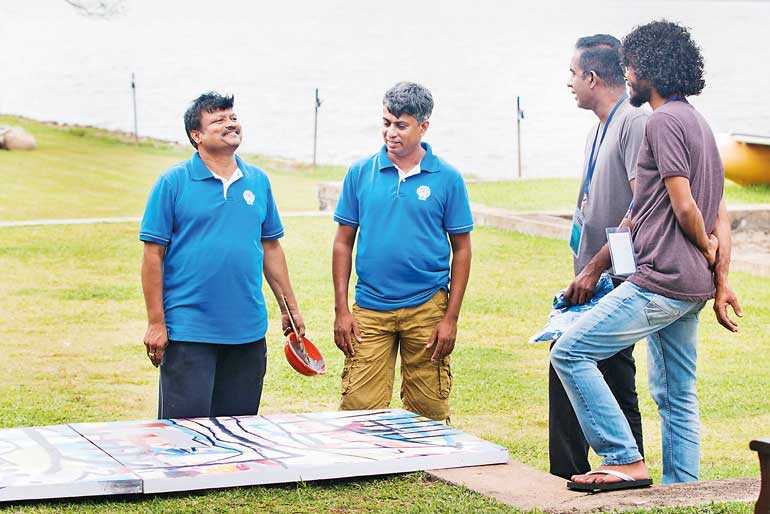
Dr. Amaranath from India finds liberation in art. He considers what he does to be painting, with a conceptual edge—creating layers atop one another, along with pigment. Fragments of memories and observations inhibit his work.
“I am talking to you right now because I am painting. This is what I love about this camp. I constantly challenge myself to create something that I cannot do within the confines of my studio. When I am confused, I engage in a visual debate and seek comfort in colours.”
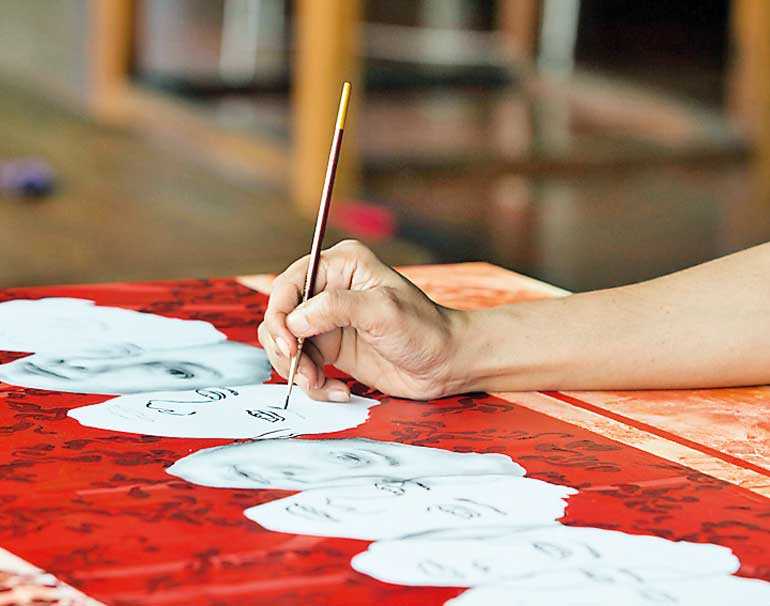
It’s her distinctive style that has earned Keya considerable praise and attention over the past few years. She is curious about the dichotomy of human behaviour and society.
With her brush, Keya nimbly approaches her subject. Her movements are meticulous and powerful. There is a teasing uncertainty about her paintings that makes a spectator wonder what to expect next.
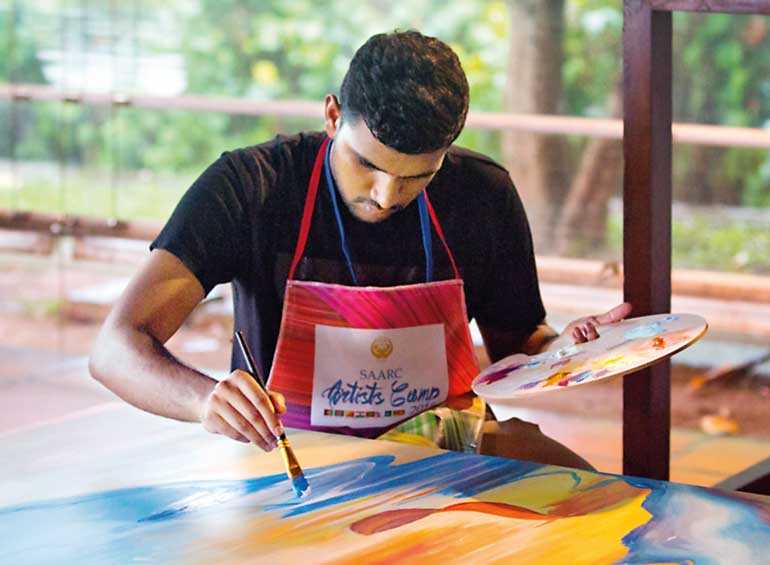
An oil lamp dominated in Zain’s painting. “It is a common element that connects our cultures,” he said. Fire is synonymous with power and often destruction. But the glistening rays of this lamp depicts containment and peace.
He completed the canvass with vibrant rhythmic strokes that reminded him of his home – the waves of the sea, in the island of Maldives.
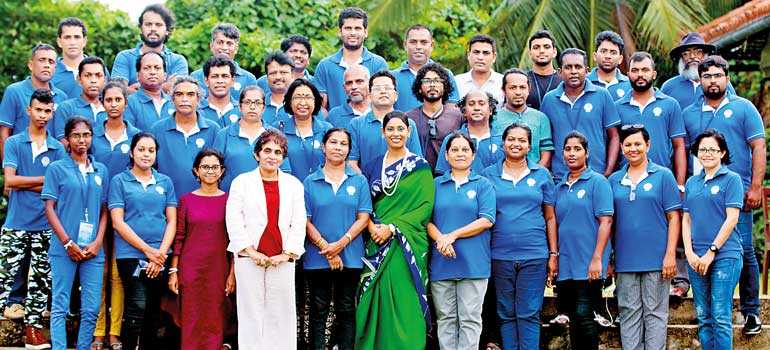
The SAARC Cultural Centre Team with the Artists